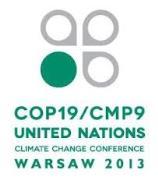More money for climate change: will Warsaw deliver?
Public versus private finance
Public investment clearly needs to drive transformative action by the private sector, which accounts for 85% of all investments worldwide. Yet there was concern at Warsaw that governments of some high-emitting countries were trying to put the focus on private finance to make up the $100bn as a tactic to avoid committing public funds. At a side event organised by the World Business Council for Sustainable Development, business leaders recognised that even the current pledge of $100bn is a "pittance". Speakers noted that while better allocation of public funds can leverage private action, public investment has to come first, because "if you don't get the public funds you cannot even think of leveraging private funds".
Global policymakers cannot rely on the private sector to lead. We must remember that the private sector (broadly defined) includes small businesses and farmers already affected by climate change. In particular, adaptation to climate change for the poorest communities offers few commercially profitable opportunities for private financiers. Those who need the money most are often difficult to invest in.
Some countries claim they are hard-pressed to provide public funds – but funds are clearly there. OECD countries, for example, subsidised fossil fuels by $55-90bn per year between 2009-2011. Germany alone subsidised coal producers by €2bn (£1.7bn) in 2011. But as recent research by LSE and Carbon Tracker shows, two-thirds of fossil fuels must be left in the ground if there is any chance of not exceeding 2 degrees of warming.
Public funds must also be used effectively. There is a risk that instead of mobilising the private sector, public funds could be misused, as in the EU carbon market fraud which caused losses of approximately €5bn (£4.17bn). Everyone has a common interest in climate finance being used effectively. While public investment can catalyse private investment, there is clearly a need for the driving force to come from public funds, including cutting fossil subsidies, to have a chance of keeping warming below 2 degrees.
Developing a finance roadmap
At the ministerial meeting, Ban Ki-Moon, the UN secretary-general, said climate finance is essential for "confidence in the process" and to increase climate action. Many vulnerable countries called for a firm timeline of targets for increasing climate finance up to 2020. Business also needs clarity in order to invest. The economic consequences of inaction on climate change are likely to be far more serious than any financial crisis. In 2009, typhoon-related costs in the Philippines already amounted to 2.9% of GDP, while superstorm Sandy was the second costliest in US history, totalling an estimated $50bn.
The Warsaw talks did establish a mechanism to address "loss and damage" from climate impacts, but losses and damages will be huge without emission reductions. The new mechanism will enhance "action and support" to address loss and damage associated with climate change, but falls short of specifying how finance will be generated for this. Rich nations resolutely avoided the issue of liability for damages caused by climate change.
Alix Mazounie from Climate Action Network said: "The Warsaw decision on finance does not provide the clarity and predictability developing countries need to plan actions and projects to tackle climate change". However, there were a few positives, with an agreement on financing to stop deforestation under REDD+. Countries also pledged $100m to the adaptation fund.
Science has warned the next few years are critical, with a risk of crossing irreversible "tipping points" in the climate system and triggering runaway climate change. While the US and Philippines (representing the G77) battled neck-and-neck over climate finance, they have more in common than you might think. Both need to stop climate change.
If there is to be effective action on climate change, global governments, particularly those of rich countries, need to commit significant public funds in the next few years. If not, there is a growing risk that climate will have impacts on current and future generations, including the private sector, that will prove catastrophic.
Helena Wright

